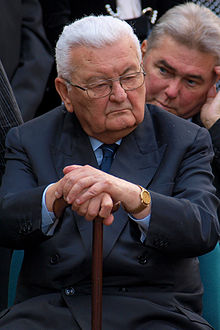Peter Boross
Péter Boross [ ˈpeːtɛr ˈboroʃ ] (born August 27, 1928 in Nagybajom, Somogy County ) is a Hungarian politician and former prime minister.
Life
At the time of the popular uprising in 1956, Péter Boross was a member of the Revolutionary Committee of Budapest and the Revolutionary Council of Intellectuals. He was one of the victims of the wave of repression after the Soviet intervention and was held in the Kistarcsa internment camp.
After the collapse of the Communist People's Republic of Hungary and the establishment of the Hungarian Republic on October 23, 1989, Boross became a minister without a portfolio on July 19, 1990 with responsibility for civil national security services and on December 20, 1990, Minister of the Interior in the cabinet of József Antall . On December 12, 1993 he was appointed Prime Minister after Antall's death. He held this office after the election defeat until he was replaced by Gyula Horn on July 15, 1994. During his tenure in 1994, the application for membership in the European Union was submitted. He then became chairman of the National Security Committee of the National Assembly . From 1998 to 2002 he was an advisor to Prime Minister Viktor Orbán , from whom he later distanced himself. Boross is a member of the Hungarian Democratic Forum (MDF).
Sources and background literature
- Short biography in rulers.org
- Biographical notes on the National Assembly homepage
- Hungarian election results 1990 to 2006
| personal data | |
|---|---|
| SURNAME | Boross, Peter |
| BRIEF DESCRIPTION | Hungarian politician |
| DATE OF BIRTH | August 27, 1928 |
| PLACE OF BIRTH | Nagybajom, Somogy County , Hungary |
